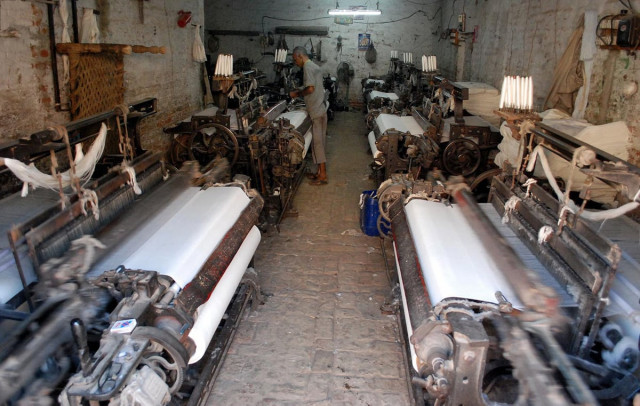Demand buffet: Exporters want rebate on energy bills, rupee devaluation
Say international competitors have depreciated currency and increased competitiveness.

"Govt doesn’t realise that there is trade war going on in the world. China, Japan, India and others have all devalued their currencies," Former finance minister Hafeez Pasha. PHOTO: INP
Leading manufacturers of textiles and economists have asked the government to let the rupee fall against the dollar and give factory owners rebate on energy bills or be prepared to face an economic crisis.
While there is no broad consensus at the moment, some experts say that rupee should be devalued by at least 6%. According to the Pakistan Bureau of Statistics, exports plunged 17% across the board in July 2015 over the same month of the previous year. The textile group, which is the largest contributor to country’s exports, saw a decline of 12%.
The drop has come at a time when Pakistan’s competitors in international markets have devalued their currencies, completely eroding margins of domestic manufacturers, industry people say.
“It’s no longer a question of if; the government would have to come up with some solutions immediately. It’s do or die for us,” said Shabbir Ahmed, chairman of Pakistan Bedwear Exporters’ Association.
Bedwear exports have taken a hard hit, going down 20% to $157 million in July 2015 compared to exports of $199 million in July 2014.
Mounting pressure has at least forced Commerce Minister Khurram Dastgir to call a meeting of the Federal Textile Board, which had been redundant for the past few years. Bed wear exporter Ahmed did not specify what incentives they want and if rupee devaluation was a priority.
“What we are going to do is present our case including the rising costs of fuel and labour. Obviously, the impact of currency devaluation in the region is a matter of concern.”
For years, Pakistan has relied on foreign aid, external borrowing and remittances to shore up its foreign exchange reserves with little focus on exports to do the same job. Former finance minister Hafeez Pasha, who now heads an independent think-tank, says perpetual reliance on external borrowing cannot go on forever.
“The government doesn’t realise that there is a low-intensity trade war going on in the world. China, Japan, India and others have all devalued their currencies. We must act now,” he said.
He believes that the rupee would have to shed 6% in value or the government would have to give 4% rebate on the value of exported goods to compensate for the rise in cost.
“The market has already started giving a signal to the government that the Pakistani rupee is overvalued,” he said, referring to decline of rupee to Rs104 against the US dollar in the open market. “The scary thing is that textile exports are down despite the concessional GSP Plus status we enjoy in the EU market. That tells us there is a slowdown in global economy.”
Utility prices, including cost of gas and electricity tariff, has been on the rise in Pakistan despite a decline in international oil rates.
That’s primarily because the cash-strived government has used gas and power bills as the easiest tools to raise funds by levying innovative taxes.
Zubair Motiwala, a bed linen exporter, says erratic expenses in the shape of ever rising utility charges have made it difficult for manufacturers to plan future investments.
“I fail to understand how is it that we are talking about raising the gas tariff when crude oil has come down to $40 a barrel? Please ask someone to explain this to me.”
The flip side
But rupee devaluation won’t be an easy proposition to get from Finance Minister Ishaq Dar who looks on the stability in currency as a benchmark for his ministry’s economic performance.
Forex Association of Pakistan President Malik Bostan concurs. “It would compromise the government’s credibility if it let the rupee fall willingly. I don’t agree with this step either. It would push up the cost of imported raw material the same exporters use.”
Published in The Express Tribune, August 23rd, 2015.
Like Business on Facebook, follow @TribuneBiz on Twitter to stay informed and join in the conversation.



















COMMENTS
Comments are moderated and generally will be posted if they are on-topic and not abusive.
For more information, please see our Comments FAQ